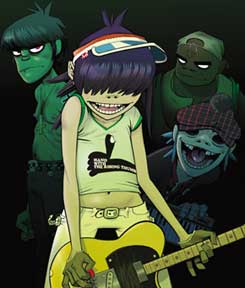 Originally published in Verbicide issue #20
Originally published in Verbicide issue #20
And to think, it all began when a crate with a little Japanese girl in it was mysteriously Fed-Ex’d to three aspiring musicians. At the time, the Gorillaz were in need of a guitarist for their newly formed band, so they placed an ad in a popular British magazine, NME. A few days later, they were the proud owners of a 10-year-old amnesiac with an extremely limited English vocabulary. It was only after some experimentation that they discovered that Noodle was also a musical prodigy. Never one to look a gift horse in the mouth, the Gorillaz hurried into the studio to create their debut album.
Related Posts
The positive response to that freshman album was immediate. Basking in the glow of worldwide celebrity, Noodle was literally the Gorillaz poster child, gaining praise for her fashion sense and eclectic guitar esthetic. Even then, the adolescent icon handled the pressure of the spotlight with considerable strength and maturity. Or, at least, that was the façade she projected. Inside, Noodle felt a growing isolation, and when the group disbanded amid rock and roll excess, she traveled back to Japan to make sense of her fractured memory.
“I had been in Japan for about a year, researching my past as it had always been a mystery to me,” Noodle explains. “It was during this period that I was awoken from my extended amnesia. And in doing so, I discovered many interesting facts about myself; one of which was that I knew the English language fluently.”
Through reuniting with a childhood mentor, Noodle had rediscovered her roots as an experimental Japanese super-soldier killing machine. It was from this sense of empowerment that Noodle drew the inspiration for the Grammy award-winning album Demon Days.
Of course, being led by a 14-year-old hasn’t always been easy for the three men of the Gorillaz. In particular, bassist Murdoc Niccals often voices his discomfort with having to play second fiddle to Noodle, as he was the one who first started the band. Still, even to him, Noodle’s talent remains undeniable.
“I was stuck in jail down in Mexico. There was no way out so young Noodle took the helm,” Niccols contends. “And she did a good job. Not as good as I would have done, but still a good job.”
Rumors of swelling egos plagued the second album. Noodle felt a strong attachment to the material of Demon Days and butted heads with the other members of the band when it came to creative decisions.
“I’m not sure if the band minds that I’m the star of this video, but whatever,” Noodle explained on the set of the video for “Dare.” “I mean, I saw way too much of Murdoc showing off in the ‘Feel Good, Inc.’ video and I thought the boys misbehaved badly in it. As I said, it’s my song. I wrote it. So I can choose who’s going to be in the video and how it’s going to be made.”
Then there were recent reports of her death as depicted in the music video for the Demon Days single “El Manana.” Photographic evidence later exposed that staged scene as a publicity stunt, but Noodle has yet to reemerge to confirm plans for future Gorillaz projects. Frequent collaborator, Damon Alburn, believes that the reason behind her absence is that there are no future albums in the works. In effect, the Gorillaz are no more.
“We’re trying to make a film next, starting in September hopefully,” Alburn speculated on BBC Radio. “It will be a film score. There won’t be another pop record.”
If true, this revelation would mark a strange end to what seemed to be a blossoming musical career — though not an entirely unexpected end. Noodle’s feelings of loneliness have always been apparent in her music and perhaps it was always her plan to burn bright and then fade away.